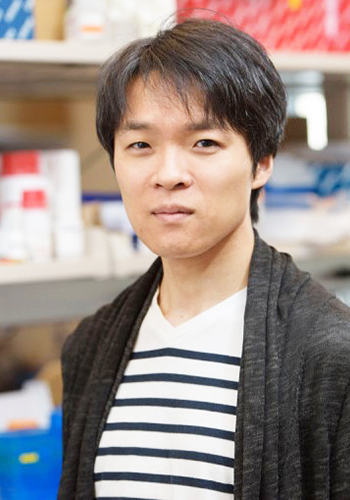Dr. Akihide Yoshimi: 2020 CDP Achievement Award Winner

2020 LLS-CDP FELLOW ACHIEVEMENT AWARD
Dr. Yoshimi is a physician-scientist from the University of Tokyo who joined the Abdel-Wahab lab as postdoctoral fellow and senior research scientist in 2015 to study the role of mutant RNA splicing factors in the pathogenesis and therapy of myeloid leukemias. Before arriving at Memorial Sloan Kettering Cancer Center, Dr. Yoshimi was a practicing clinical hematologist/oncologist as well as a research member at the Department of Hematology and Oncology, the University of Tokyo (the Mineo Kurokawa laboratory) where he studied the functional genetics and molecular biology of myeloid malignancies while he saw patients with leukemias and other hematologic disorders. He completed his postdoctoral training in 2020 and he is now the Section Head of the Cancer RNA Research Unit, at the National Cancer Center Research Institute in Tokyo, Japan.
It is my great honor and pleasure to be selected for the LLS CDP Achievement Award. Both LLS CDP Special Award and Achievement Award enabled me to leverage and develop my research skills with respect to spliceosome mutant leukemias, through focused and deliberate support from my mentor, Dr. Omar Abdel-Wahab at Memorial Sloan Kettering Cancer Center. At the end of the Awards, I was better equipped to lead basic and translational research as an independent PI at National Cancer Center Japan and continue my development toward impact and prominence to fight against blood cancers.
Dr. Yoshimi was awarded the CDP Special Fellow Award in 2018 for his project titled Spliceosomal Dysfunction in the Pathogenesis of IDH-mutant Leukemogenesis.
Acute myeloid leukemia (AML) is a cancer of blood cells characterized by the rapid growth of abnormal cells that build up in the bone marrow and blood and interfere with normal blood production. AML is curable only in 35% of patients under 60 years old and in 10% of patients over 60. Improvements in the dismal outcome of these patients will likely come from deep understanding of the disease. Mutations in IDH1 and IDH2 are present in 10-20% of AML patients and are among the most common causes of AML. Importantly, new drugs blocking the function of mutant IDH1/2 are among the most promising therapies for AML patients, and an inhibitor of mutant IDH2 has recently received FDA approval for AML. IDH1/2 mutations affect the chemical modifications (epigenetic) of DNA. We recently identified the co-existence of IDH2 mutations with SRSF2 mutations in over 400 AML patient samples. Importantly, the co-existence has a functional consequence as IDH2 mutations directly affect SRSF2 activity. SRSF2 mutations alter the way that the genetic information is translated into proteins and are a common feature of some subsets of blood cancer. How the epigenetic regulator IDH2 affects splicing is unknown. We are investigating how combined mutations in IDH2 and SRSF2 promote leukemia development and impact the function of mutations in either gene. We have also found that a huge protein complex involved in gene regulation, called Integrator, loses its function due to combined effects of IDH2 and SRSF2 mutations, which accounts for some of the key features of leukemias. This link between Integrator and cancer has never been reported, and we seek to understand the roles of Integrator in leukemia development for the first time. We are also studying the therapeutic potential for combining drugs blocking mutant IDH2 with those blocking SRSF2. In a clinical trial of a drug which blocks functions of mutant IDH2, AML patients with both IDH2 and SRSF2 mutations were shown to have an inferior outcome to patients with IDH2 mutation alone. Our hypothesis is that combining drugs blocking both mutant IDH2 and SRSF2 will improve the adverse outcome of patients with both IDH2 and SRSF2 mutations. These studies will contribute to our understanding of leukemia development and may also provide a novel combination therapeutic approach for AML patients.
During the award period (2018-2020) Dr. Yoshimi focused on (1) understanding the biology and molecular basis of mutations in the RNA splicing factor machinery in cancer, and (2) developing novel therapies targeting cells bearing these mutations. Some highlights:
1. Understanding the basis for frequent co-occurrence of mutations affecting RNA splicing and the epigenome in leukemia:
- identified frequent overlap of mutations in the citric acid cycle enzyme IDH2 and the RNA binding protein SRSF2 that together promote leukemogenesis through coordinated effects on the epigenome and splicing
- identified that mutant IDH2/SRSF2 co-expression resulting in lethal leukemias, providing the first functional evidence that mutations in splicing factors drive leukemia
- revealed a pathogenic crosstalk between altered epigenome and splicing and identify altered splicing as a mediator of IDH2-mutant leukemia
2. Developed a novel, clinical-grade inhibitor of RNA splicing:
- collaborated with H3B Biomedicine Inc. to develop a novel, orally bioavailable inhibitor which perturbs interaction of the SF3b complex of the spliceosome to RNA and demonstrated the promising therapeutic potential of splicing modulation in spliceosome mutant cancers
3. Understanding SF3B1 mutations via a pan-cancer analysis:
- characterized over 100 tumors harboring hotspot mutations of SF3B1, the most commonly mutated splicing gene across cancers, and identified hundreds of mis-splicing events common and specific to different cancer types.
- found that the most common SF3B1 mutation activates MYC via effects conserved across human and mouse cells: these mutations promote aberrant splicing in the PP2A phosphatase subunit PPP2R5A and increase MYC S62 and BCL2 S70 phosphorylation which, in turn, promote MYC protein stability and impair apoptosis, respectively
- demonstrated that pharmacologic PP2A activation impaired SF3B1-mutant tumorigenesis elucidating a therapeutic approach to aberrant splicing by mutant SF3B1
All first author publications during the award period:
- Nature. 2019;;574(7777):273-277.
- Cancer Discov. 2020 Jun; 10(6): 806–821.
- Nat Med. 2018;;24(4):497-504.
- Oncogene. 2020;;39(15):3218-3225.